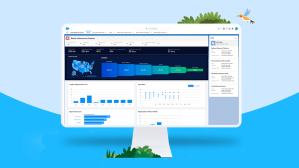Quick Take: Global consulting leaders and Salesforce partners Capgemini, Deloitte Digital, and PwC share why the time is now for the automotive industry to be investing in digital transformation.
According to Salesforce’s Automotive Trends Report, only 1% of customers are fully satisfied with their car buying experience. And, 93% of all automotive companies agreed that first-party data will help them substantially improve the customer experience.
That’s why today Salesforce introduced Automotive Cloud to help the automotive industry adjust to a changing landscape. Powered by Driver 360, Automotive Cloud leverages industry-specific automation and AI to help automakers, dealers, and automotive finance groups provide best-in-class service and experiences across every customer interaction.
Salesforce’s extensive partner ecosystem offers automotive industry expertise and solutions to support companies implementing Automotive Cloud, and tailors those implementations to specific customer needs.
Here’s what three Salesforce partners shared about how Automotive Cloud is helping address these challenges and changing the future of the automotive industry:
Q: How has the automotive industry adapted to the way people today buy and drive their cars?
- “While the customer experience has traditionally been owned by dealers and manufacturers, the pandemic accelerated the shift to mainstream adoption of online vehicle purchasing. Nearly half (46%) of car dealers reported that at least 9% of recent vehicle sales took place entirely over the internet – a trend which dealers expect to continue to grow rapidly. Because of this, dealers are looking for ways to connect with potential customers via digital channels earlier in the buying journey and to help reduce disconnects between the digital and in-person experience,” said Ian Kahn, US Salesforce Practice Leader, PwC.
- “Car retailers who moved to an online car purchase experience are meeting customers where they are, without sacrificing profit. More electric vehicle (EV) manufacturers have entered the market, and these have a direct-to-consumer business model that allows them to curate a more personalized user experience. Legacy carmakers are moving quickly to become more software centric so they can develop platforms that allow customers to continue to customize their total automotive experience after they have purchased the vehicles,” said Dennis Sarafa, Managing Director, Deloitte Digital.
- “The automotive industry is in a large transformation. Automakers and dealers are trying to move from purely sales-focused to customer-centric organizations. We see large ambitions in these areas, yet some organizations still have a limited view on their end customers due to complex sales structures and missing data,” said Markus Winkler, EVP, Global Automotive Industry, Capgemini.
Q: How will Automotive Cloud play a role in the way automakers and dealers are reaching customers and doing business?
- “The availability of detailed data in the end-to-end hybrid consumer journey (online and in person) offers a goldmine of insights into key behaviors, preferences, purchase propensity, experience gaps, and more. These insights coming from digital tools like Automotive Cloud are informing highly segmented, personalized marketing campaigns and sales tactics for the auto industry to help meet customers where they are and deliver a differentiated experience,” said Kahn.
- “The initial wave of digital technology deployed during the pandemic helped automotive dealers solve for an immediate need. Now, automakers, finance companies, and dealers need to make a more strategic shift to be able to work collaboratively and create a transformative customer experience. Integrated solutions like Automotive Cloud allows automakers to have a single view of their customer and all of the data to generate real-time insights that provide a truly curated purchase and ownership experience,” said Sarafa.
- “For managing customer demand, technology like Automotive Cloud is essential to enable holistic customer data management, empower adaptive vehicle and asset management, and build a relevant, connected customer ecosystem. Yet, to properly leverage these digital tools, it is essential to have a clear and consistent IT and platform strategy and establish partnerships to co-create the right solutions that support business goals and customer needs,” said Winkler.
Q: Why is now the right time for the auto industry to be investing in digital solutions like Automotive Cloud?
- “There is a critical need to connect the dots with tools like Automotive Cloud that allow for a holistic, 360-degree view into the complete consumer experience, both online and in person, in a scalable way. Having these insights in near real time give brands and their partners a blueprint for evolving and fine-tuning their consumer-centric strategies across sales, marketing, and service that aligns with customers’ most recent attitudes and perceptions,” said Kahn.
- “The automotive industry will change more in the next ten years than it has in the last hundred. Everything about the industry is changing – from what we build to how we build, the materials we use, the supply chain, how we purchase, financing models, and ownership. Automotive Cloud is coming at a pivotal time to help automakers, their finance companies and dealers build a unified view and approach to their customer,” said Sarafa.
- “The automotive industry is in the middle of many large, customer-related transitions with constantly evolving requirements. The industry needs digital solutions that help simplify a complex environment with many auto specific stakeholders and fast-changing requirements. Automotive Cloud has an advanced toolset compared to non-industry specific solutions to solve the demands of the automotive industry. Salesforce is providing technology that can help automakers succeed with changing end customer buying and usage behavior,” said Winkler.
Salesforce technology powers Formula 1 innovation
Salesforce is also partnering with automotive and racing brands to reach new audiences with innovative uses of Salesforce technology. This year, Salesforce partnered with Formula 1 to power and grow fan engagement for the most prestigious motor racing competition. Through the partnership, F1 is leveraging the Customer 360 to provide greater insight into and understanding of their global fan base to help inform behaviors, communication, and actions with their fans as they engage with the sport, while bringing them closer to the action than ever before.
Go deeper:
- Learn more about Salesforce Automotive Cloud here.
- Learn more about Salesforce’s partner ecosystem here.
- To read more about the Salesforce and Formula 1 partnership, click here.
- Tune into Salesforce’s new series “The Shift” to see how Formula 1 (episode available Oct. 24) and CarMax (episode available Nov. 7) are navigating digital transformation to thrive in today’s market here.
- Follow @partnerforce on Twitter, check out the @partnerforce Instagram account, and discover Salesforce Partners on LinkedIn.
- Please see www.deloitte.com/us/about for a detailed description of our legal structure.















